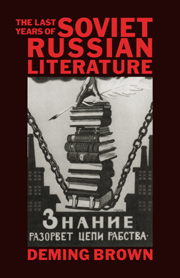Book contents
- Frontmatter
- Contents
- Preface
- Acknowledgments
- 1 The literary situation: publication, genres, criticism
- 2 From “stagnation” to “openness”
- 3 Retrospective writing about the Stalin period
- 4 Village prose: its peak and decline
- 5 The “forty-year-olds”
- 6 Other voices
- 7 “Tough” and “cruel” prose
- 8 New faces
- 9 Conclusion
- Notes
- Select bibliography
- English translations of Soviet Russian prose
- Index
4 - Village prose: its peak and decline
Published online by Cambridge University Press: 13 October 2009
- Frontmatter
- Contents
- Preface
- Acknowledgments
- 1 The literary situation: publication, genres, criticism
- 2 From “stagnation” to “openness”
- 3 Retrospective writing about the Stalin period
- 4 Village prose: its peak and decline
- 5 The “forty-year-olds”
- 6 Other voices
- 7 “Tough” and “cruel” prose
- 8 New faces
- 9 Conclusion
- Notes
- Select bibliography
- English translations of Soviet Russian prose
- Index
Summary
In the fifties, sixties and seventies, the authors of “village prose” – literature about the Russian and Siberian countryside – created a rich body of writing about the age-old, but now threatened, peasant way of life. Often this was a literature of protest over the harsh and unfair lot of the farmer, herded into collective and state farms, deprived of volition, frustrated by the ignorant and impractical demands of central planners, and neglected and exploited by arrogant urban authorities. As a censored literature, it seldom was able to tell the whole truth about the cruelty and malfunctioning of the agricultural system dictated from above, but it did achieve more candor than did writing about any other sector of Soviet society.
At the same time, this literature re-examined in great detail the way of life of rural Russians – their traditions, customs, values, psychology, and aspirations. Most of the village writers were themselves of peasant origin, proud of their roots and eager to celebrate the best of their heritage, but also unafraid of exploring its dark sides. On the whole, village prose displays an intricate mixture of filial affection and solicitude for the countryside and its inhabitants on the one hand, and sadness, revulsion, and anxiety about their future on the other.
Many Soviet critics have argued against the use of the term “village prose,” and many writers who have been said to belong to this school have either expressed their discomfort or disavowed membership altogether.
- Type
- Chapter
- Information
- The Last Years of Soviet Russian LiteratureProse Fiction 1975–1991, pp. 79 - 99Publisher: Cambridge University PressPrint publication year: 1993



